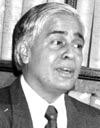
What the President said about the Judiciary and the Chief Justice said about the executive
During a function held to launch the country’s first Buddhist television channel at the Sri Sambohi Viharaya in Colombo on Friday, President Mahinda Rajapaksa praised the independence of Sri Lanka’s judiciary and said he was proud of it. Speaking in the presence of Chief Justice Sarath N. Silva as well as Defence Secretary Gotabhaya Rajapaksa, the President said even though his opponents and critics have been talking of a “Rajapaksa Samagama” and various other things, the judiciary has been untouched by such criticism.
The President said there were 26 television channels and 37 radio stations operating in the country. He claimed that some of the programmes aired on these radio stations were disrupting the lives of the people. Because of this, he said the government was forced to ban one radio station. He said no one saw this as an act of censorship of the media and no one had taken to the streets to protest the move. Earlier in the day Chief Justice Sarath N. Silva speaking at the launch of the provincial Appeal Court in Colombo, extolled the fearlessness and efficiency of the judiciary stating it did not function haphazardly like the Executive. “I can say this fearlessly. It (the executive) says one thing the first day, another next and on the third day it utters some lie and goes away,” he said. The Chief Justice said the judiciary works with a great deal of dedication and does an honest job, according to its conscience. He said the judiciary with a staff of around 4,000 and 300 Judges does an excellent job, superior to that of both the Executive and the Legislature. The Chief Justice also added that Judges of lower courts had been given training to work independently and the Sri Lankan judiciary had a brave set of junior magistrates who had even sent powerful millionaires to jail. The Chief Justice said that creation of the Provincial Appeal Court would go a long way to clear the backlog of the large number of pending cases and expedite the judicial process. He said at present there are 14,000 appeals pending and cases filed as far back as 1995/96 were being heard today. He added that though 1,700 cases were being filed in the Appeal Court annually, only 600 hearings could be completed. The CJ said as the majority of the backlog is from the Western Province, as such three Courts were set up in Gampaha, Kalutara and Colombo. Of the 3,868 cases in the Western province, 2,358 are from the Colombo district, he said. The President of the Colombo Law Society Upul Jayasuriya, delivering the vote of thanks said that during the last one month, news from Hultsdorp has been great and had created substantial public interest and enthusiasm with more bouquets than brick bats. The “telecom sale”, the “Sevenagala case” and the “lodgers case” have created confidence, a new vista, and has encouraged those in the field of public interest litigation, he said. Mr. Jayasuriya also expressed his views on the reported move to reintroduce Criminal Defamation is an offence.“Having walked a long path in the dark era of criminal defamation, particularly in the field of media freedom, two members of the legal professions fell victim to the draconian law that was in the statute books some years ago. This law was repealed by Parliament with unanimity.” he said. Mr.Jayasuriya said there were reports that the highest ranking persons in the government were making an effort to give life to this law that is now dead and buried. “If such attempts are pursued, one must bear in mind that the legal profession is still existent and shall not hesitate to stand up in the name of fundamental rights and the freedom of expression if the circumstances necessitate us to do so,” he said. He also highlighted the fact that certain employers defrauded lawyers via legal fees charged and later appropriated by respective companies, instead of the same being paid to the legal officers. Justice Ministry Secretary Suhada Gamlath said that efforts had been made since 2004 to increase the number of Courts of Appeal, but had been delayed due to the disagreements in Parliament. “Having failed, on the direction of the Chief Justice Sarath N. Silva we had to resort to the alternative of opening Civil Appeal High Courts,” he said. Attorney General C. R. de Silva, Court of Appeal President K. Sripavan, Judicial Services Commission Secretary P. W. D. C. Jayatilake , High Court Judges and Magistrates were among those present at the event. |
|| Front
Page | News | Editorial | Columns | Sports | Plus | Financial
Times | International | Mirror | TV
Times | Funday
Times || |
| |
Copyright
2007 Wijeya
Newspapers Ltd.Colombo. Sri Lanka. |

